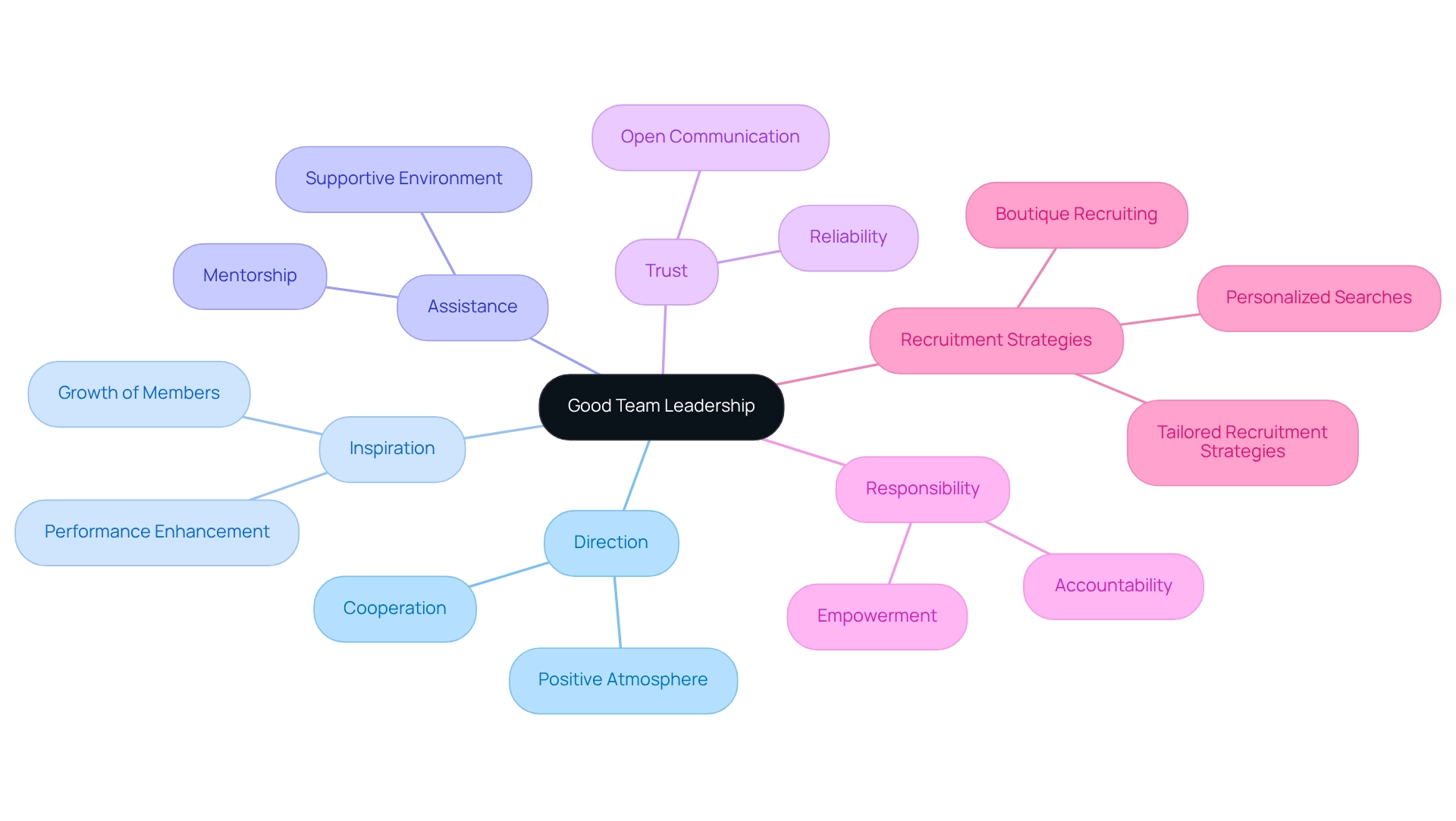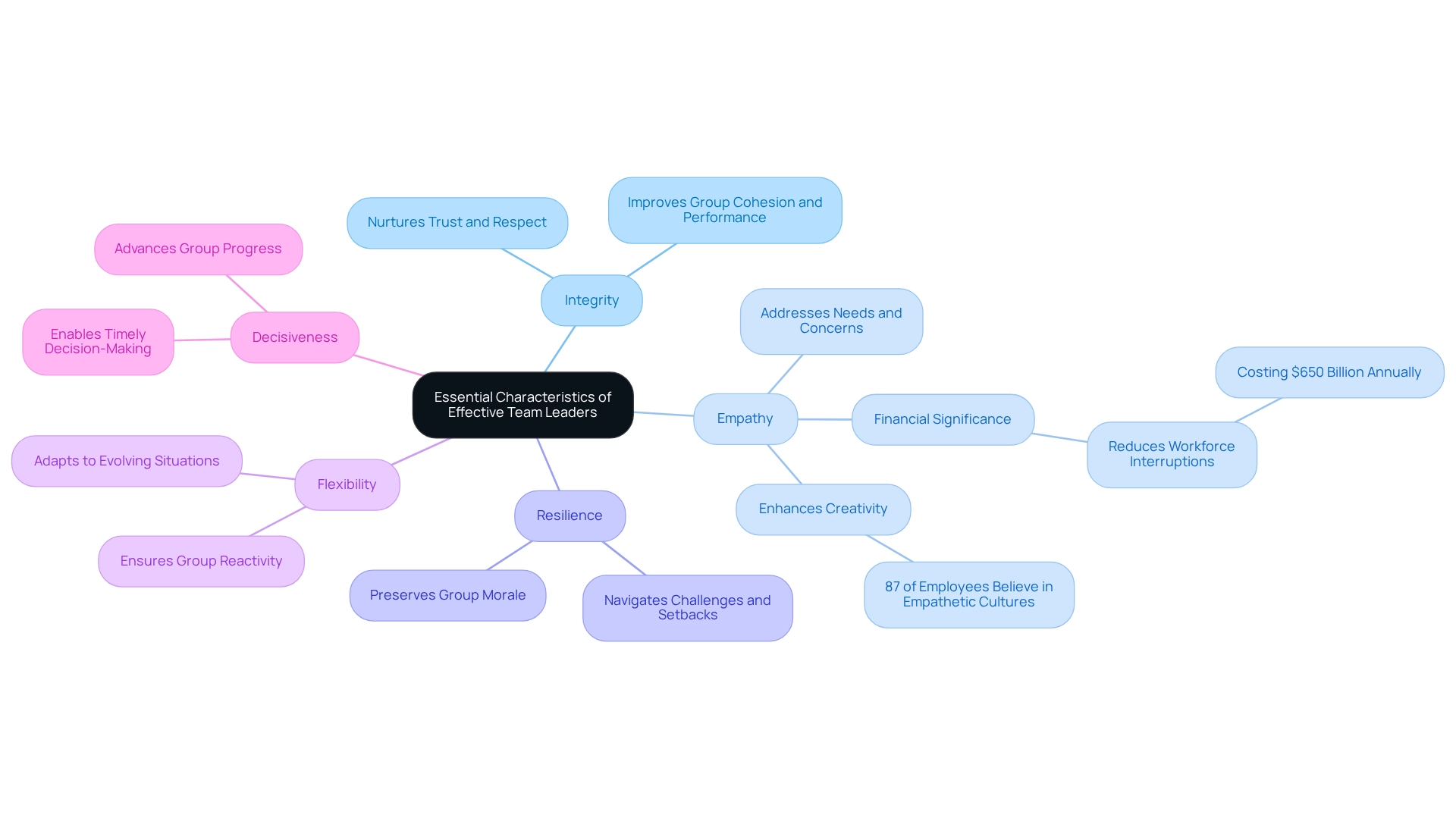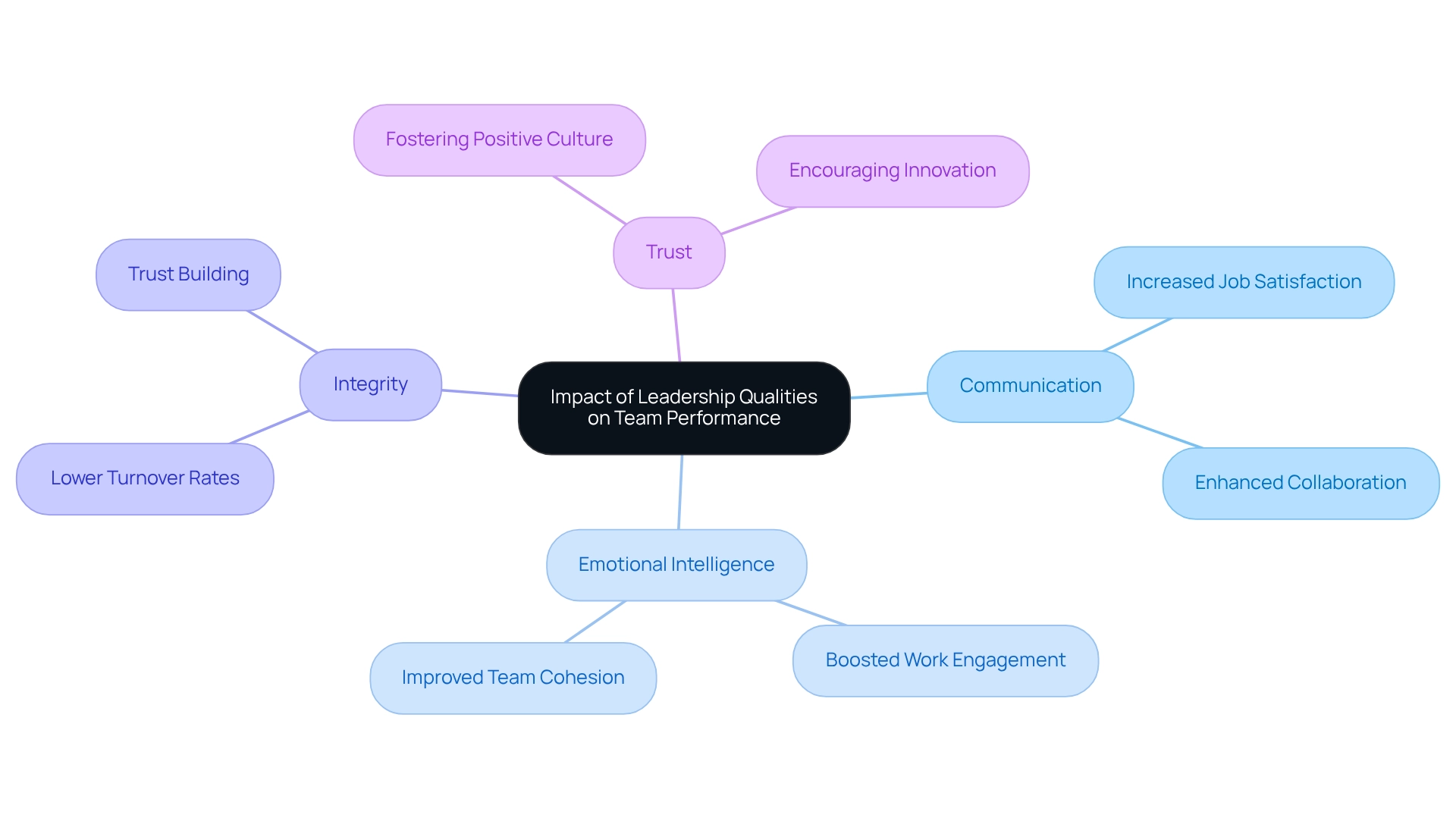Overview
The article identifies key qualities of a good team leader:
- Integrity
- Empathy
- Resilience
- Flexibility
- Strong communication skills
These traits are essential for effective leadership and significantly enhance team performance. By fostering trust, improving group cohesion, and creating a positive workplace culture, these qualities ultimately lead to increased job satisfaction and reduced turnover. Such insights underscore the importance of selecting leaders who embody these characteristics, a crucial consideration for organizations aiming to thrive in today’s competitive landscape.
Key Highlights:
- Effective group leadership involves directing, inspiring, and assisting members towards shared goals.
- Key qualities of a good team leader include integrity, empathy, resilience, flexibility, and decisiveness.
- Integrity fosters trust and improves group cohesion, while empathy helps leaders understand team needs.
- Resilience and flexibility enable leaders to navigate challenges and adapt to changing situations.
- Strong communication skills are crucial for clear expectations, constructive feedback, and open dialogue.
- Conflict resolution abilities promote a harmonious work atmosphere, enhancing productivity and engagement.
- Strategic thinking aligns team efforts with organizational goals, driving success and innovation.
- Leaders who prioritize these qualities can significantly improve team dynamics and overall performance.
- A positive workplace culture, influenced by effective leadership, can reduce employee turnover and increase job satisfaction.
Introduction
In an increasingly complex and competitive business landscape, the significance of effective team leadership has reached unprecedented heights. Exceptional leaders embody a distinctive blend of skills and characteristics that not only motivate their teams but also propel organizational success. They cultivate environments where collaboration thrives and individual well-being takes precedence, thereby fostering a culture of trust and accountability.
This article examines the essential traits of effective leaders, including integrity and empathy, and investigates how these qualities profoundly influence team dynamics and performance. By recognizing the crucial role of leadership in shaping a positive workplace culture, organizations can more effectively identify and nurture the leaders who will guide their teams toward success in the years ahead.
Defining Good Team Leadership
Effective group leadership reflects a good team leader qualities, as it involves the capability to direct, inspire, and assist individuals in achieving shared objectives. This encompasses a variety of attributes and abilities that are considered a good team leader qualities, fostering a positive group atmosphere, promoting cooperation, and enhancing performance.
Successful group facilitators demonstrate a good team leader qualities by concentrating not only on task achievement but also on the growth and welfare of their members, creating an environment of trust and responsibility. This dual focus on results and relationships is essential for long-term success in any organization.
In the context of hiring, understanding a good team leader qualities is crucial for identifying candidates who can effectively guide technical and HR groups. How can organizations ensure they attract such leaders?
- Boutique Recruiting specializes in personalized searches designed to pinpoint individuals who embody these essential characteristics.
- By focusing on tailored recruitment strategies, we help organizations draw in top talent that aligns with their vision.
Ultimately, a good team leader qualities encompass not just achieving results, but also nurturing relationships that foster a thriving workplace. Are you ready to elevate your recruitment process? Reach out to us for a consultation and discover how we can help you build a stronger team.

Essential Characteristics of Effective Team Leaders
Effective group facilitators embody several essential characteristics, and among a good team leader qualities, integrity and empathy stand out as foundational traits. Integrity nurtures trust and respect among colleagues, fostering a positive work atmosphere. In fact, research shows that individuals who exhibit integrity significantly improve group cohesion and performance. Empathy, in contrast, allows individuals in positions of authority to genuinely comprehend and tackle the needs and concerns of their group, which is increasingly acknowledged as essential in today’s workplace. Research indicates that compassionate management can result in a decrease in workforce interruptions costing companies $650 billion each year, emphasizing its financial significance and the necessity for supervisors to focus on understanding their staff.
Resilience is another essential trait, enabling individuals to navigate challenges and setbacks while preserving group morale and concentrating on solutions. Flexibility is also crucial, as it prepares individuals to react efficiently to evolving situations, guaranteeing that their groups stay nimble and reactive. Decisiveness also plays a key role, enabling timely decision-making that can advance groups forward.
These characteristics together represent a good team leader qualities that enable individuals to inspire and motivate their groups, enhancing performance and success. Coaches emphasize that when individuals in charge prioritize integrity and empathy, these traits are among a good team leader qualities that not only enhance group dynamics but also stimulate productivity and retention. As Austin Connolly, Lead Editor, notes, “When you use empathy to improve in these core areas, you’ll soon see how the emotional and cognitive shift stimulates productivity, improves retention, and generates new avenues for employees to help your business improve their bottom line.” Furthermore, organizations that foster empathetic environments are perceived as more innovative, with 87% of employees believing that such cultures enhance creativity. Effective group leaders cultivate these environments by actively engaging with their members, including mirroring body language and facial expressions to signal understanding and connection. This highlights the significance of integrity and empathy in fostering effective guidance in 2025 and beyond.

Key Skills and Traits for Successful Team Leadership
Effective group leadership relies on a blend of essential skills and traits, which are a good team leader qualities like strong communication, conflict resolution, and strategic thinking. Effective communication is paramount; it facilitates the clear transmission of expectations, constructive feedback, and the encouragement of open dialogue among members. Studies indicate that 96% of employees at Gem.com report a positive workplace culture, largely attributed to effective communication practices that foster collaboration and trust among team members.
Conflict resolution abilities are equally significant, allowing individuals to address and mediate disputes, thereby promoting a harmonious work atmosphere. Leaders who excel in this area contribute to a culture where employees feel valued and appreciated, directly linking this to increased productivity and engagement. Acknowledging employee achievements, for instance, has been shown to significantly enhance motivation and overall effectiveness. A case study titled “Recognizing Progress and Achievements” highlights that frequent recognition of employee contributions leads to enhanced commitment and a more positive workplace culture.
Strategic thinking further empowers individuals in authority to establish clear goals and align group efforts with organizational objectives. This skill, coupled with effective delegation, motivation, and emotional intelligence, enhances group dynamics and performance. By cultivating these competencies, individuals in leadership can embody a good team leader qualities that foster a more engaged and productive team, ultimately driving success within their organizations.
Examples of effective communication and conflict resolution can be observed in leaders like Bill Gates, who promotes innovation and continuous learning through initiatives such as ‘Think Weeks.’ Such approaches exemplify how strategic guidance can nurture a culture of growth and collaboration. As authority figures emphasize, the ability to convey messages clearly and resolve disputes is not merely advantageous but essential for effective group management in 2025 and beyond. As Jenn, an Indeed Career Coach, remarked, “In my last position, I helped every individual in my group exceed their previous records for the best sales quarter,” illustrating the tangible outcomes of robust leadership practices.
The Impact of Leadership Qualities on Team Performance
The attributes of a leader, which encompass a good team leader qualities, significantly impact group effectiveness and overall organizational success. Leaders who demonstrate a good team leader qualities, including strong communication abilities, emotional intelligence, and integrity, foster a positive group culture that encourages collaboration and innovation. Inspiring guidance not only enhances followers’ psychological capital but also significantly boosts work engagement. This demonstrates how the qualities of a good team leader directly influence group dynamics and effectiveness.
For instance, a study revealed that groups with leaders who emphasize open communication and trust experience significantly lower turnover rates and increased job satisfaction. This highlights the crucial role of a good team leader qualities in guiding group dynamics and enhancing performance results.
Furthermore, a report by Hays highlights that 47% of employees leave their positions due to poor company culture. This illustrates how a good team leader qualities can help mitigate turnover and foster a more engaged workforce. Effective collaboration is also essential for implementing innovation in organizations, as high-performing groups are more likely to successfully execute innovative solutions.
As Iveta Baltrukenaite, a content writer, observes, ‘Plecto is an effective tool for enhancing group productivity and results!’ This emphasizes the significance of using the appropriate tools in conjunction with robust guidance to improve group effectiveness. Ultimately, the qualities of a good team leader enhance team engagement and serve as a catalyst for innovation within organizations, making effective leadership a vital component of successful team performance.

Conclusion
The exploration of effective team leadership reveals that exceptional leaders possess a unique combination of qualities that not only drive results but also nurture their teams. Integrity and empathy emerge as foundational traits that cultivate trust and understanding—essential for fostering a positive workplace culture. These attributes enhance team dynamics and contribute to improved performance and retention, underscoring their critical role in today’s business environment.
Moreover, the importance of strong communication, conflict resolution, and strategic thinking cannot be overstated. These skills empower leaders to set clear expectations, mediate disputes, and align team efforts with organizational goals. As demonstrated through various studies and examples, leaders who excel in these areas significantly enhance employee engagement and satisfaction, ultimately leading to greater organizational success.
In conclusion, the qualities and skills of effective leaders are pivotal in shaping team performance and fostering a culture of collaboration and innovation. As organizations look to the future, prioritizing the development of such leaders is essential for navigating the complexities of the modern business landscape. By cultivating these traits within their leadership ranks, companies can ensure they are well-equipped to guide their teams toward sustainable success in the years ahead.
Frequently Asked Questions
What are the key qualities of an effective team leader?
Effective team leaders possess qualities that enable them to direct, inspire, and assist individuals in achieving shared objectives. These qualities include fostering a positive group atmosphere, promoting cooperation, and enhancing performance.
How do successful group facilitators demonstrate good team leader qualities?
Successful group facilitators focus on both task achievement and the growth and welfare of their members, creating an environment of trust and responsibility. This dual focus on results and relationships is essential for long-term success.
Why is understanding good team leader qualities important in hiring?
Understanding good team leader qualities is crucial for identifying candidates who can effectively guide technical and HR groups, ensuring that organizations attract leaders capable of fostering a productive and supportive work environment.
How does Boutique Recruiting help organizations find effective leaders?
Boutique Recruiting specializes in personalized searches designed to pinpoint individuals who embody essential leadership qualities. They focus on tailored recruitment strategies to help organizations attract top talent that aligns with their vision.
What is the ultimate goal of identifying good team leader qualities?
The ultimate goal is to achieve not just results but also to nurture relationships that foster a thriving workplace, contributing to the overall success of the organization.